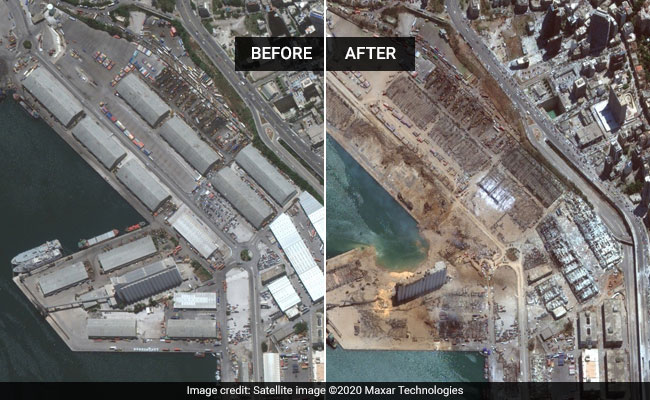
The explosions were logged by seismologists, registering as the equivalent of a 3.3-magnitude earthquake.
The city of Beirut has been left overwhelmed after two blasts on Tuesday killed 113 people and injured thousands others. The before and after picture of the Lebanese capital describe the disaster that the city is currently going through. Photos posted online show damage to the city, bloodied and wounded people stumbled among the debris, glass shards and burning buildings. Videos show smoke billowing from the fire, followed by a mushroom cloud following the blast at the city's port.
The explosions -- which were heard in Nicosia, 240 kilometres away in Cyprus -- were logged by seismologists, registering as the equivalent of a 3.3-magnitude earthquake.

The second blast sent an enormous orange fireball into the sky, immediately followed by a tornado-like shockwave that flattened the port and shattered windows across the city.

About 2,750 tonnes of ammonium nitrate were stored in the Beirut port warehouse that exploded Tuesday, devastating large parts of the Lebanese capital, Prime Minister Hassan Diab said.

Ammonium nitrate is an industrial chemical commonly used in fertilisers and as an explosive for quarrying and mining. It is an oxidiser considered relatively safe if uncontaminated and stored properly. But it is extremely dangerous if contaminated, mixed with fuel or stored unsafely.
Experts have noted the colour of the smoke and "mushroom cloud" seen in footage of Tuesday's blast as characteristic of ammonium nitrate explosions.

The huge explosion has piled even more pressure on Lebanon's strained health sector, which before the disaster was already struggling with a wave of coronavirus cases and a severe economic crisis.

"I think there are between 250,000 and 300,000 people who are now without homes," said Governor Marwan Aboud, adding that the estimated cost of the damage from Tuesday's explosion was between $3.0 billion and $5.0 billion dollars.

Around 4,000 people were hurt by the blasts, with injuries recorded right across the city. The most powerful explosion to hit Beirut in years shook the ground, leaving some residents thinking an earthquake had struck.

Emergency medical aid and pop-up field hospitals were dispatched to Lebanon Wednesday along with rescue experts and tracking dogs, as the world reached out to the victims of the explosion that devastated Beirut.

Lebanese Red Cross said more than 4,000 people were being treated for injuries after the explosion, which sent glass shards and debris flying
(With inputs from Agencies)




